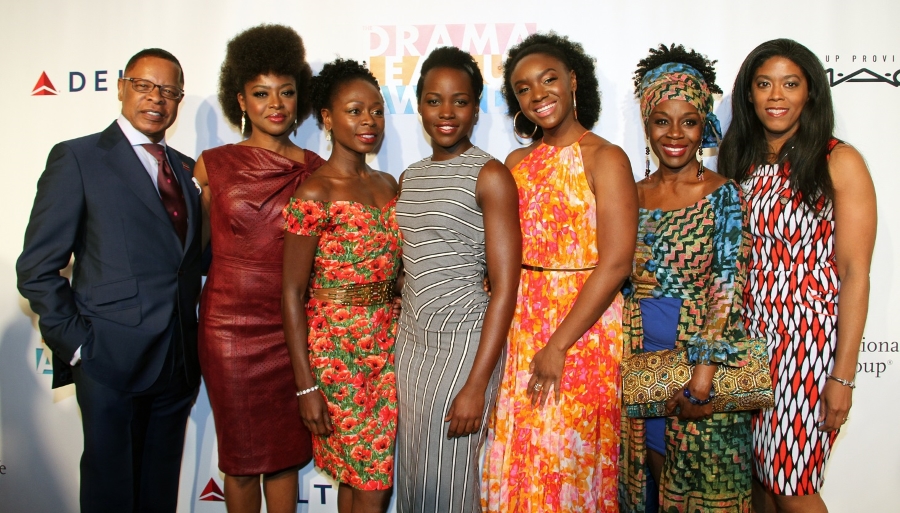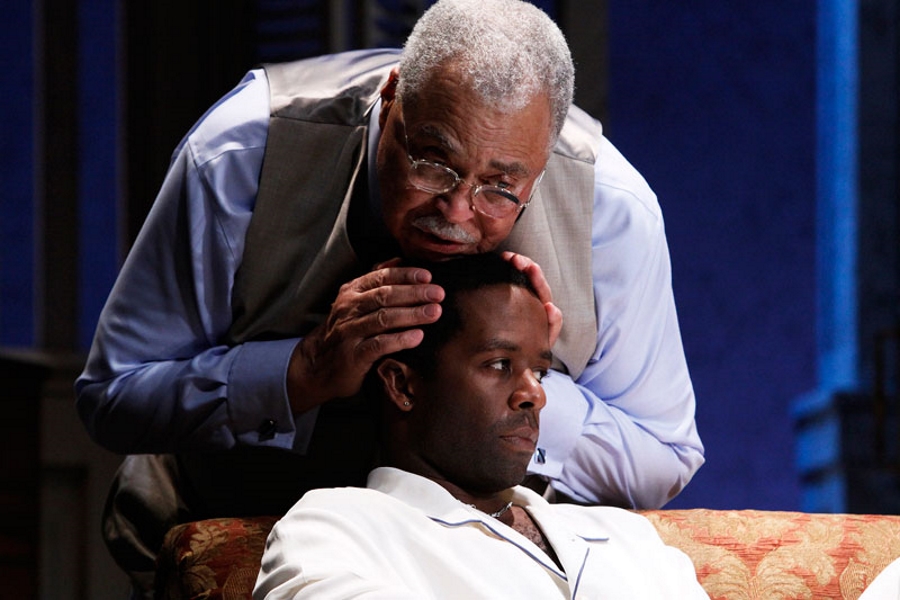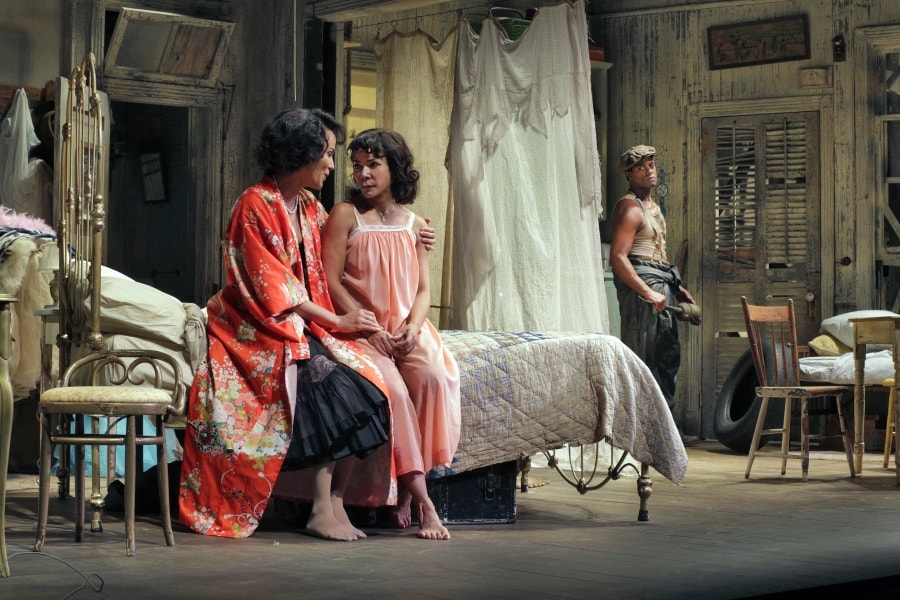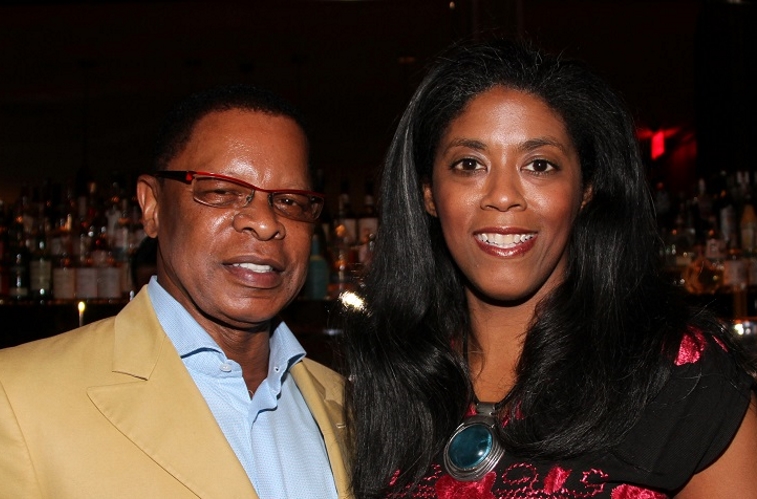Stephen C. Byrd and Alia Jones-Harvey are out to change the game on Broadway. The only black lead producers in that space, the pair runs a company, Front Row Productions, which has as its explicit goal to diversify the Great White Way. Among their credits: They brought Danai Gurira‘s Eclipsed to Broadway last season and are currently working to bring both The Wiz and Black Orpheus to Broadway. They are also investors in Cirque du Soleil’s Paramour.
They will be honored, along with Gurira, at Theatre Communications Group‘s annual gala on Nov. 14. American Theatre caught up with Byrd and Jones-Harvey to learn about what goes into bringing a production to Broadway and the many challenges producers meet along the way.
You both have backgrounds in finance. How did you get into theatre?
Stephen C. Byrd: From my perspective, it was a love of theatre. When I left Wall Street, I started out looking at bringing the classics to the film industry and redoing revivals of classics with film, and Hollywood pretty much said, “We don’t need you to do that.” Then I decided that on Broadway, as I always say, there is an audience between Tyler Perry and August Wilson that we should be looking at. So I got the rights for Cat on a Hot Tin Roof and A Streetcar Named Desire, and that was our beginning.
Alia Jones-Harvey: I took some entertainment courses during business school. Stephen was a mentor of mine. I was transitioning from consumer products into financial services, and early on in our conversations, he mentioned the production of Cat on a Hot Tin Roof and his goal of bringing the first all-black cast of Cat to Broadway. Flash forward to 2006—he called me and said he was ready to bring it to Broadway, and asked if I would partner with him.
What is a typical work day as a producer?
Jones-Harvey: Answering a lot of emails. What is interesting is what is different when you are on Broadway and involved in a production, and when we’re not. Right now, we have a production that is running [Paramour], and on a daily basis we are receiving sales data that we are able to evaluate. We offer input to the marketing and advertising teams from what we see in the sales data. We are also receiving daily inquiries from playwrights, actors, and even potential directors about the projects that we are looking at and what we would potentially invest in in the future.
Byrd: There is no typical day, actually.
Jones-Harvey: That’s a good point!
Byrd: It’s a lot of going to see other productions as well, networking within the industry, interacting with potential investors, going to readings and workshops, and sourcing other new material. Before we did Eclipsed, we were primarily interested in producing revivals. So there is no typical day—we are constantly looking at the next project and the availability of theatres. Right now, we have two productions, and one of them is in development. So we are meeting with the creative team and looking for a theatre for our next production.

What is a typical timeline of bringing a show to Broadway?
Byrd: For Eclipsed, that was fast, because Lupita Nyong’o’s team came to us with the project with the Public to become involved. So when you have the Public Theater on board, which is a very good brand, and Lupita attached, that was a fast trajectory. In the instance of something like Cat, that was a long period. I started on Cat in 1995, and we didn’t get it to Broadway until 2008. There were starts and stops and changes to the creative team and so on and so forth.
What are some of setbacks you’ve experienced?
Byrd: Everything is dependent on deciding on a project that you want to go with, getting the finances together, and most importantly, finding a theatre. There are only three major theatre owners, and for every one show going into a theatre, there are 10 others behind it. With musicals now—which are long-running, open-ended runs—it makes it very difficult to bring a play in and to find a home. There are challenges on Broadway because of the limitation of theatres.
Have you ever had a production and no home for it?
Byrd: With Cat, we had an all-star cast, so it was a lot easier to get a theatre at that particular time. But while we had the theatre, investors, and our cast, there was a union strike. So the theatres weren’t available. And then there was a writers’ strike—the actors had nowhere to go, which was good for us. By the time we circled back to the theatre owners, they told us we were No. 20 in line. On my birthday, I got a call from Gerry Schoenfeld and he said, “We’ve got a theatre for you, but you’ve got to be in by January.” He called me in November, so we had to reassemble the cast, the money, and be ready to go in the midst of Thanksgiving and Christmas.
Are there more Broadway houses now than when you were producing in the ’90s?
Jones-Harvey: Not yet! This season there will be one new theatre, but in the time that we have been on Broadway, there have been 40.
Byrd: For the one new theatre this year, though, there is the Helen Hayes, which will be closing for a year, so that will be off the market.

Are you finding it easier to produce new work on Broadway as opposed to revivals?
Byrd: We’ve had no alternative but to look at new projects now. With a lot of the revivals, everyone pretty much knows what the game is, so everyone goes after revivals. So we have to source new material as well as investing in other people’s shows.
Do you think that diversity has improved onstage and behind-the-scenes since you began your producing career?
Stephen: It has always been diverse onstage.
Jones-Harvey: The types of roles, though, are new. I think there is a lot more opportunity now, in the time that we’ve been on Broadway, for actors of color to have opportunities for lead roles.
Byrd: But that is just the actors. I think that the change we are talking about, on Broadway as a whole, you have to look at the unions. Has there been change in the unions? Probably not. Are there changes to the various other ancillary tentacles to Broadway? Not a lot from what I’ve seen.
What about diversity in the audience?
Jones-Harvey: On each production that we’ve worked on, we’ve made attempts of integrating new marketing strategies and new marketing agencies, even looking at having some parallel advertising that is not necessarily theatre-specific but more broad-based to develop new audiences. It has definitely been a challenge but one that we will continue to push forward with. We think there is a lot of opportunity to diversify—particularly with advertising—to reach new audiences that are supporting theatre regionally but that are not necessarily being invited to Broadway.
Byrd: I think the outreach is something that we’ve been able to do, overall. Sometimes you build the field and they will come, such as with The Color Purple and, when it was running, Shuffle Along. There are certain plays and musicals, which, given the talent attached, will attract an audience under any circumstances. I doubt very highly if producers are going out to actively recruit the African-American demographic to come see On Your Feet!. They just assume that we are here and that that audience will come, which is not always the case and we’ve seen that happen with a number of shows.
Just as importantly, both Alia and myself as members of the Broadway League, are part of the diversity committee. We go out and speak to students and to small panels and do a tremendous amount of outreach. Alia even taught a course at City College. We are trying to do our best to let people know that we are here, but there is only so much that we can do when we mount the show. To say, “Okay, is there an African-American or female electrician involved? Or a carpenter or sound designer?” That’s where the buck stops.
For Eclipsed, you launched the Ten Thousand Girls initiative to bring young women who might not have access to Broadway to the theatre. Will that initiative continue?
Jones-Harvey: We are definitely continuing the program. As you may have read, Eclipsed will continue on and it is scheduled to be presented at the Curran Theatre in San Francisco in March 2017. The Ten Thousand Girls initiative will continue on, and if there are other productions of it going forward, the structure has been set up so that Ten Thousand Girls can always be a part of it. For our other future productions, we will see. There is a lot of opportunity to do outreach to new audiences and people that may not have been able to have a Broadway experience, so we are definitely championing any of those initiatives. We’ve worked with TDF and some other organizations that are doing outreach programs.

There is a lot more to producing than raising funds. What is the hardest part?
Byrd: The hardest part is always the next challenge that is unknown to you. It could be any aspect of producing, whether it is getting a theatre, raising the money, getting the talent—putting the whole package together to produce is always a challenge. Each tangent and aspect of producing is always the most challenging situation until it is resolved.
Ever think of throwing in the towel?
Byrd: Every day! I love the business, that is part and parcel of what we do. We love the theatre community as a whole, in spite of some of the issues that we have addressed. Unlike working for a corporation or other organizations, you get to do business with people you like and where there is chemistry. If I didn’t like it, I would just retire. But I don’t play golf.
What advice would you offer to aspiring producers?
Jones-Harvey: To recognize that it is all about building relationships within the theatre community and with potential investors, and that there is always room for new ideas on Broadway. We witnessed that with Eclipsed in how it was embraced by the Broadway community, the theatre owners, and Tony voters alike.
Byrd: Always get a good attorney!
Jones-Harvey: You should elaborate on that story…
Byrd: Donald Farber, who passed away recently, was my mentor. When I found out that I got the rights to A Streetcar Named Desire and Cat on a Hot Tin Roof, I spoke to the woman who was the executor of the estate, Maria St. Just, who was Tennessee Williams’s best friend and who Maggie from Cat was based on. I spoke to her and she said, “Well, make me an offer.” I didn’t know how to make an offer, so I ran to the Coliseum Bookstore on 57th and Broadway and bought every book on producing that I could find. About 95 percent of them were written by Donald Farber, so I just picked up the phone and gave him a call and he told me to come over. He taught me everything about the business from that point on, and how to make an offer. Three days after I made the offer, Maria St. Just passed away.
Jones-Harvey: So Cat on a Hot Tin Roof was meant to be.
Byrd: After that I went to James Earl Jones. We met and spent two hours together—I asked him if he wanted to play Big Daddy. He stood up and said, “I always wanted to play that cracker.” He was quite a character, and once you have James involved, then everything falls into place. The stars were aligned, and Cat became the biggest-grossing play on Broadway at that time.


